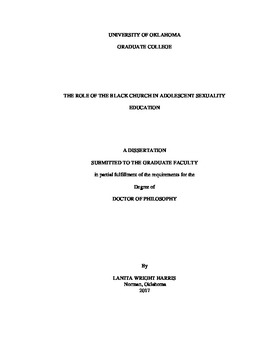| dc.contributor.advisor | Cheney, Marshall | |
| dc.contributor.author | Harris, LaNita | |
| dc.date.accessioned | 2017-08-01T19:08:52Z | |
| dc.date.available | 2017-08-01T19:08:52Z | |
| dc.date.issued | 2017-08 | |
| dc.identifier.uri | https://hdl.handle.net/11244/51869 | |
| dc.description.abstract | Objective: To identify pastors’ and parents’ opinions of the Black Church’s role in promoting adolescent sexual health and preventing teen pregnancy. The Black Church institution is an important partner in preventing teen pregnancy. Methods: Semi-structured interviews were conducted with Black Church pastors (n=31) and parents (n=36) in two counties in a southwestern state. Interviews were conducted September 2014-July 2015 (pastors) and February-June 2017 (parents). The question paths were developed based on interviews with local leaders, literature searches, and key informant interviews. Questions included knowledge/beliefs about sexuality education, church’s role in preventing teen pregnancy, and implementation obstacles. Interviews were transcribed and analyzed for themes. Results: Seven pastor themes emerged: 1) all pastors believed the Black Church should address teen pregnancy with parents/congregants; 2) two major obstacles emerged: a) all pastors perceived social consequences, including resistant parents; and b) many were uncomfortable discussing contraceptives/condoms; 3) all pastors were willing to partner with organizations, but most had reservations based on conflicting missions/values; 4) pastor response to teen sexual activity and teen pregnancy was grounded in patriarchal Black Church institution; 5) pastors discouraged teen sex based on biblical beliefs and complications of sex but used different ways; 6) many pastors perceived their church congregants’ responses to teen pregnancy as loving and supportive, other pastors said congregants were judgmental and insisted on negative consequences for the pregnant/parenting female; 7) pastors’ opinions of their leadership role and their response shifted when dealing with teen sexual activity to teen pregnancy. Five parent themes emerged: 1) most parents said there should be no boundaries on the type of sexuality information shared by their church, but later changed their minds after reviewing a list of potential topics; 2) parents listed parent-child communication, goals and dreams, and relationships as the most important topics for a teen pregnancy prevention intervention; 3) parents said the information shared during workshops should be judgement-free and realistic; 4) parents most often said pastors and/or youth pastors/directors should deliver sexual health information; 5) parents believed older adults and other parents may oppose teen pregnancy prevention programs. Conclusions: These studies add to sexual health literature that explores the interrelationship between the Black Church and public health institutions and their roles in preventing teen pregnancy. Black Church pastors and parents were supportive of teen pregnancy prevention programs in the church. However, public health partners must be willing to compromise and overcome significant obstacles. | en_US |
| dc.language | en_US | en_US |
| dc.subject | Black Church | en_US |
| dc.subject | Teen Pregnancy Prevention | en_US |
| dc.subject | Public Health | en_US |
| dc.title | The Role of the Black Church in Adolescent Sexuality Education | en_US |
| dc.contributor.committeeMember | Branscum, Paul | |
| dc.contributor.committeeMember | Larson, Daniel | |
| dc.contributor.committeeMember | Maness, Sarah | |
| dc.contributor.committeeMember | Mayeux, Lara | |
| dc.contributor.committeeMember | Taylor, E. Laurette | |
| dc.date.manuscript | 2017 | |
| dc.thesis.degree | Ph.D. | en_US |
| ou.group | College of Arts and Sciences::Department of Health and Exercise Science | en_US |
| shareok.orcid | 0000-0002-8922-104X | en_US |
